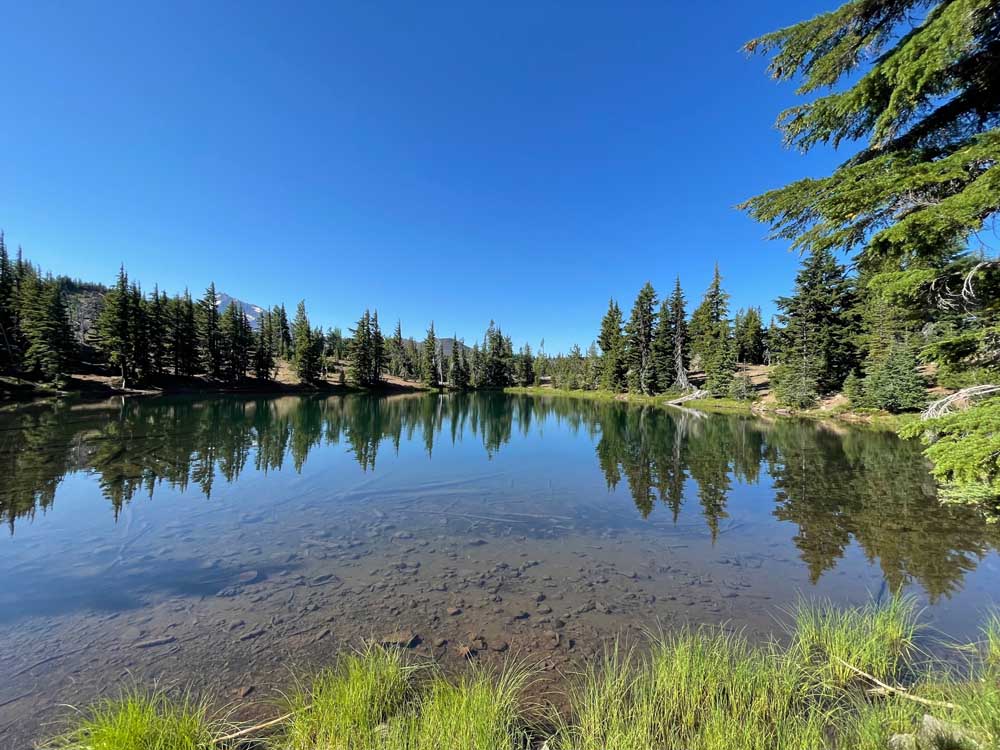Matthieu Lakes loop hike is a relatively easy trek in the Three Sisters Wilderness
Published 6:00 am Friday, August 19, 2022

- South Matthieu Lake near McKenzie Pass in the Three Sisters Wilderness.
McKENZIE PASS — Many avid Central Oregon hikers are still adjusting to the permit system implemented last year for 19 trailheads within the Three Sisters, Mount Washington and Mount Jefferson wilderness areas.
Day-use permits ($1) at those trailheads are released in rolling windows between June 15 and Oct. 15, with 60% of available permits released 10 days in advance, and the remaining 40% released two days in advance.
Trending
I have hiked much less than normal the past two summers because I admittedly have been uncommitted to planning ahead to purchase a permit for day hikes. On Monday, I decided to check out what permits were available on recreation.gov for a hike on Tuesday, just one day in advance.
Not surprisingly, the extremely popular Green Lakes and Broken Top trailheads west of Bend were booked. But a few other trailhead permits within the Three Sisters Wilderness were available, including Scott Trailhead and Lava Camp Lake Trailhead near McKenzie Pass.
I purchased a permit for Lava Camp Lake, printed it out, and planned for a hike to Matthieu Lakes.
The Cascade foothills west of Sisters near McKenzie Pass are home to numerous treks. Some are demanding all-day hikes that lead to the base of the mountains, and a few others are half-day commitments that are relatively easy.
The 6.5-mile Matthieu Lakes loop, about a 45-minute drive from Bend, is a fairly short, moderate, family-friendly trek. To find the trailhead, turn onto McKenzie Pass Highway in Sisters, then turn left onto a gravel road about half a mile before the Dee Wright Observatory, following signs for Lava Camp Lake.
The loop includes the North Matthieu Lake Trail and part of the Pacific Crest Trail in the Three Sisters Wilderness.
Trending
I put my permit in my backpack, then set out along the path from the parking area, which led me to a trail junction after just two-tenths of a mile. I turned onto the North Matthieu Lake Trail and planned to return along the PCT.
The loop includes 800 feet of net elevation gain, and I steadily climbed as I drew closer to the Three Sisters.
The first lake along the route, North Matthieu, is just a couple of miles into the hike and is in a deep forest and bordered by a rocky lava flow.
I continued up the trail and eventually reached the spot where the North Matthieu Lake Trail connects to the PCT. A few more yards and I reached South Matthieu Lake and was face to face with the massive, craggy North Sister.
The small, round, clear lake reflected the trees in the pristine setting. I looped around the lake and explored the area, climbing toward Scott Pass, where I took in an even more dramatic view of North Sister, with Middle Sister just barely visible to the south.
From the lake, the PCT continues toward North Sister, and I pushed on for another half a mile or so, following a rocky lava flow. Finally, I grew tired and decided to head back, but it’s easy to see why so many hikers are drawn to the PCT — you never know what inspiring mountain scenery is around the next corner unless you keep walking.
The 2,650-mile PCT runs from Canada to Mexico, and the portion of the trail over McKenzie Pass is one of the most heavily traveled sections — and for good reason. The views of North Sister and Middle Sister are fantastic, but the PCT there also offers glimpses of Mount Washington and Mount Jefferson.
The trail cut along the ridgeline with a few switchbacks and was an easy descent along soft dirt. The vast rocky lava field that covers much of the McKenzie Pass stretched to the north.
When I made it back to the trailhead about three hours after starting, I was tired but not utterly exhausted. With my extra scrambling, the hike was 7.3 miles with nearly 1,000 feet of elevation gain.
Perhaps a positive result of the new permit system is it encourages hikers to seek out new or originally unintended destinations such as Matthieu Lakes. While Green Lakes and No Name Lake (reached via the Broken Top Trailhead) are popular for good reason, there are hundreds of more miles of trails to explore within the Central Oregon Cascades.








